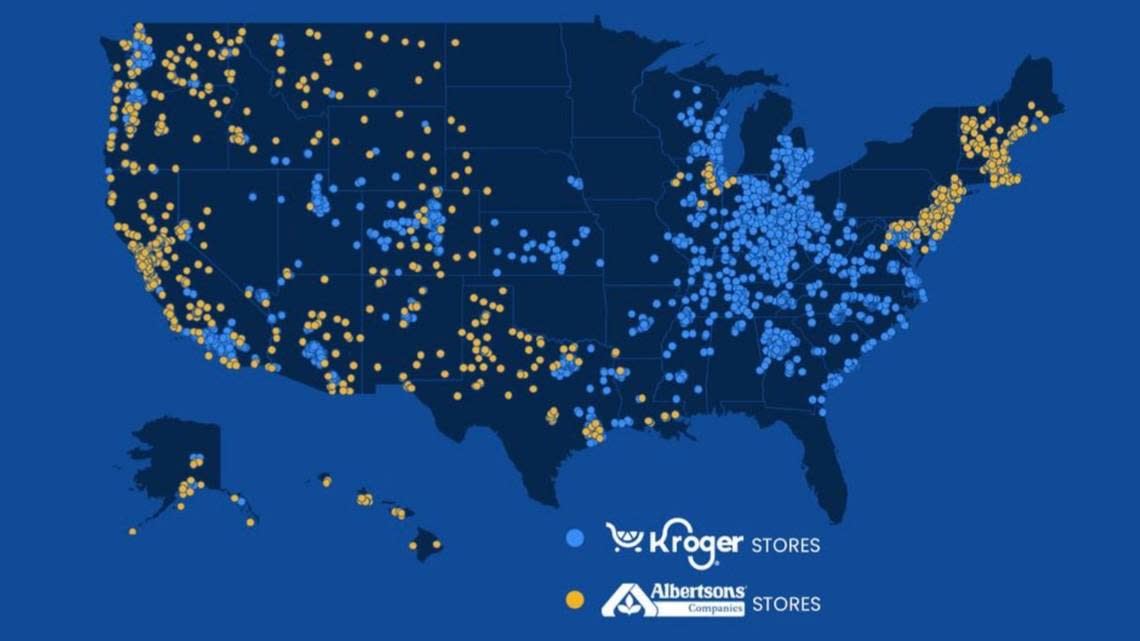Boise’s Albertsons hit with lawsuit to delay $4 billion payout to shareholders amid merger
Washington Attorney General Bob Ferguson sued on Tuesday to block Albertsons from issuing a $4 billion payout to its shareholders until state and federal antitrust enforcers have reviewed the grocery chain’s proposed merger with Kroger.
Kroger announced on Oct. 14 that the two supermarket giants had agreed to merge in a $24.6 billion deal, with Kroger buying all of Albertsons’ outstanding stock. The merger agreement included a special dividend of up to $4 billion — or $6.85 per share — that Boise-based Albertsons would pay to its shareholders on Monday, Nov. 7.
But according the Washington State Office of the Attorney General, which has viewed filings with the Securities and Exchange Commission, the $4 billion dividend exceeds Albertsons’ cash on hand. In those filings, according to Ferguson’s office, Albertsons said it planned to make the payment with $2.5 billion in cash and the rest borrowed from elsewhere.
Ferguson sued in King County Superior Court in Seattle. He also filed a request for a temporary restraining order to block Albertsons from making the dividend payment while Ferguson’s lawsuit is pending.
Albertsons told the Idaho Statesman that the lawsuit was “meritless” and has “no legal basis.”
“The special dividend announced on Oct. 14 is the means by which we are independently executing our longstanding capital return strategy and is scheduled to be paid to Albertsons Cos.’ stockholders on Nov. 7,” Albertsons said in an email. “It is not contingent on our merger with Kroger and is not in any way a condition to Albertsons Cos.’ or Kroger’s obligation to consummate the proposed merger – it will be paid regardless of whether the merger is completed.”
The lawsuit comes after a bipartisan group of six attorney generals from around the country, including Idaho Attorney General Lawrence Wasden, sent a letter to Albertsons urging the company to delay paying the special dividend until after the merger had been thoroughly reviewed.
“Paying out $4 billion before regulators can do their job and review the proposed merger will weaken Albertsons’ ability to continue business operations and compete,” Ferguson said in a news release.
Ferguson argued that making the payment now would undercut Albertsons’ ability to compete during the time regulators are scrutinizing the merger. The lack of cash on hand could result in Albertsons struggling to keep up with inventory orders, resulting in empty shelves and potentially impacting store employee hours, he said.
“The allegation that this dividend will somehow hinder our ability to compete in the marketplace is also meritless,” Albertsons said. “Given our financial strength and positive business outlook, we are confident that we will maintain our strong financial position as we work toward the closing of the merger.”
Albertsons declined to delay the special dividend payment, which resulted in Ferguson’s lawsuit. It accuses Kroger and Albertsons of violating Washington state antitrust laws and the Washington state’s Consumer Protection Act.
“Free enterprise is built on companies competing, and that competition benefits consumers,” Ferguson said. “Corporations proposing a merger cannot sabotage their ability to compete while that merger is under review.”
Albertsons has sold stock publicly since June 2020 but remains controlled by Cerberus Capital Management, a New York private equity firm that leads a group of investment companies that first acquired part of the former Albertsons Inc. in 2006. Cerberus alone still holds roughly 30% of Albertsons’ shares and would collect a large share of the special dividend.
The two grocery giants combine for over 30 locations in the Boise area. Albertsons has 39 stores throughout Idaho and owns several Safeway stores throughout the state. Kroger owns 11 Fred Meyer stores in the Gem State.
Albertsons is Idaho’s largest company and a Boise icon, with $72 billion in yearly sales, 290,000 employees nationwide and more than 5,000 employees in Idaho, the Idaho Statesman previously reported. Kroger, based in Cincinnati, employs 420,000 people nationwide, including more than 2,000 in Idaho.

The Washington State Office of the Attorney General expects a hearing on the temporary restraining order sometime this week.
